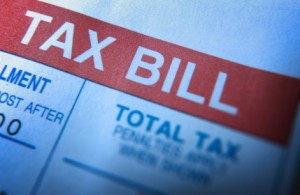 Your pocketbook is set to get a lot leaner on January 1. While Congress and the President stay busy electioneering, a whole set of tax cuts, tax breaks, and exemptions are set to expire. Forget about tax cuts for the rich – the forty-one tax breaks set to expire include the 2 percent payroll tax break for anyone who works, income tax breaks, and several of the common household exemptions.
Your pocketbook is set to get a lot leaner on January 1. While Congress and the President stay busy electioneering, a whole set of tax cuts, tax breaks, and exemptions are set to expire. Forget about tax cuts for the rich – the forty-one tax breaks set to expire include the 2 percent payroll tax break for anyone who works, income tax breaks, and several of the common household exemptions.
The potential tax bomb set to hit January 1 is so big that analysts are calling it “The Fiscal Cliff” and speaking in hushed, worried tones about its impact. Since Congress couldn’t do its job and pass a tax bill before the elections, chances are slim that they’ll get anything done between the elections and the installation of the new president. Here’s the some of what’s going to happen, and a few ideas about how you can keep from free falling off the fiscal cliff.
Bye-Bye Payroll Tax Break
One tax break that’s going away that you’ll notice right away is the payroll tax break. It’s been giving you 2 percent more in your paycheck each week, and though 2 percent doesn’t sound like a big number, the extra $20, $50, or $100 it represents is all the breathing room some people have. The typical American family enjoyed an extra $1,000 in take-home pay because of the payroll tax break, and that’s going to be hard to make up.
The end of the payroll tax break is combined with a health care tax increase. Thank Obamacare for the jump in Medicare contributions from 1.45 percent of your check to 2.35 percent of your check. And the jump will be even bigger if you’re self-employed, if you’ve got a combined household income of over $250,000, or you run your business as an S corporation.
To cushion the blow a bit, try to put as much of your check as possible in pre-tax saving accounts. Retirement accounts, health savings accounts, flexible transport accounts – they can all reduce your official take-home pay amount in the eyes of the government, lowering your payroll taxes.
New book reveals how to keep this “gangster” economy from murdering your money…
Hello, Higher Taxes on Savings
On January 1, you’ll also face higher taxes on your savings and passive income. Interest and dividends will be taxed more intensively, as will capital gains. While on the surface this looks like a soak-the-rich plan, the reality is that it will hit middle class savers and the elderly right in the shorts.
Take my own grandfather as an example. He lives off his savings and his Social Security check. He gets by, but he’s hardly rich. When the taxes on interest go up, he’s going to feel the pinch, and at eighty-seven, he’s too old to go back to work. He followed all the rules of saving up for his old age, and now the government’s too busy with political posturing in an election year to protect him.
The solution isn’t to save or invest less, though that certainly seems to be how this tax hike is intended. Prepared minds can look at the options and perhaps choose to put more money in gold, silver, and other tangible assets. When these things increase in value, there’s no interest, and thus no interest tax rate to worry about as you preserve wealth.
Goodbye, Exemptions
Along with income tax hikes that will hit January 1, a number of household exemptions are disappearing. You can wave goodbye to $600 per dependent of credits, $500 of child credit per child, credits for employer-provided childcare, and tax breaks for certain educational assistance programs. You’ll find more rules on itemized deductions, changes to estate and gift tax rules, and limits on how long you can deduct certain student loan interest charges.
It all adds up to more confusion and frustration around doing your taxes – more ways to mess up, more ways to get dinged, and more ways to attract the attention of the IRS. While losing some of the deductions is being touted as a way to ensure the rich are paying their “fair share” the increased estimated tax rates go up the most for middle income families making between $35,000 and $70,000.
The only thing to do is try to keep it as simple as possible, and double check your favorite deductions for changes before making any big tax decisions. Talk to a tax expert and make sure you’re informed with the latest moves – if any – out of Congress once the elections are over.
January 1 will be the start of a new tax year, and a year that could be pretty tough for many of us. Read the fine print, consult with a tax planner, and remember to thank your Congressional representative for all changes!
©2012 Off the Grid News
 Off The Grid News Better Ideas For Off The Grid Living
Off The Grid News Better Ideas For Off The Grid Living




